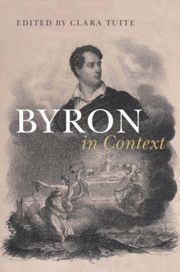Description
Byron in Context
Literature in Context Series
Coordinator: Tuite Clara
Illuminates the multiple contexts in which the life, works and reception of Lord Byron (1788–1824) are understood.
Language: English
Byron in Context
Publication date: 11-2021
375 p. · 15.2x22.9 cm · Paperback
Publication date: 11-2021
375 p. · 15.2x22.9 cm · Paperback
Byron in Context
Publication date: 12-2019
514 p. · 16.1x23.5 cm · Hardback
Publication date: 12-2019
514 p. · 16.1x23.5 cm · Hardback
Description
/li>Contents
/li>Biography
/li>
George Gordon, the sixth Lord Byron (1788?1824), was one of the most celebrated poets of the Romantic period, as well as a peer, politician and global celebrity, famed not only for his verse, but for his controversial lifestyle and involvement in the Greek War of Independence. In thirty-seven concise, accessible essays, by leading international scholars, this volume explores the social and intertextual relationships that informed Byron's writing; the geopolitical contexts in which he travelled, lived and worked; the cultural and philosophical movements that influenced changing outlooks on religion, science, modern society and sexuality; the dramatic landscape of war, conflict and upheaval that shaped Napoleonic and post-Napoleonic Europe and Regency Britain; and the diverse cultures of reception that mark the ongoing Byron phenomenon as a living ecology in the twenty-first century. This volume illuminates how we might think of Byron in context, but also as a context in his own right.
Part I. Life and Works: 1. Early years Jonathan Gross; 2. The years of fame Diego Saglia; 3. Exile Jane Stabler; 4. Texts and editions Tom Mole; 5. Byron and his publishers Mary O'Connell; 6. Piracies, fakes and forgeries Gary Dyer; Part II. Political, Social and Intellectual Transformations: 7. Politics John Beckett; 8. War Neil Ramsey; 9. Greece's Byron Spiridoula Demetriou; 10. Byron's Italy Timothy Webb; 11. Orientalism Gerard Cohen-Vrignaud; 12. Religion Christine Kenyon Jones; 13. Natural philosophy Thomas H. Ford; 14. Sexuality Richard C. Sha; 15. Libertinism Adam Komisaruk; 16. Fashion, self-fashioning and the body Laura J. George; Part III. Literary Cultures: 17. Classicism and neoclassicism Bernard Beatty; 18. Epic (and historiography) Carla Pomarè; 19. Romance Omar F. Miranda; 20. Byron's lyric practice Anna Camilleri; 21. Satire Mark Canuel; 22. The Satanic School Mirka Horová; 23. The Lake Poets Madeleine Callaghan; 24. Byron's accidental muse: Robert Southey Susan J. Wolfson; 25. 'Benign ceruleans of the second sex!': Byron and the Bluestockings Caroline Franklin; 26. The Pisan Circle and the Cockney School Maria Schoina; 27. Drama and theatre Rolf P. Lessenich; 28. Autobiography Alan Rawes; 29. 'Literatoor', literary theory and critical practice Clara Tuite; 30. Periodical culture, the literary review and the mass media Andrew Franta; Part IV. Reception and Afterlives: 31. Contemporary critical reception to 1824 William Christie; 32. Byron, radicals and reformers Jason Goldsmith; 33. European reception Peter Vassallo; 34. Recollections, conversations and biographies Julian North; 35. Posthumous reception and re-invention to 1900 Eric Eisner; 36. Popular culture Lindsey Eckert; 37. Byron now Ghislaine McDayter.
Clara Tuite is Professor of English at the University of Melbourne, where she is also a Co-Director and Lead Researcher with the Research Unit in Enlightenment, Romanticism and Contemporary Culture. She is the author of Romantic Austen: Sexual Politics and the Literary Canon (Cambridge, 2002) and Lord Byron and Scandalous Celebrity (Cambridge, 2015), which was awarded the Elma Dangerfield Prize of the International Association of Byron Societies. In 2017, she was elected to the Australian Academy of the Humanities.
© 2024 LAVOISIER S.A.S.
These books may interest you

Lord Byron and Scandalous Celebrity 107.81 €




